 After a hearty breakfast we say farewell to our hosts. We pile into a servees bound for Ramallah. It is about an hour-and-a-half away. The temperature drops as we ascend- no wonder Ramallah used to be a favourite destination for Palestinians in the summer.
After a hearty breakfast we say farewell to our hosts. We pile into a servees bound for Ramallah. It is about an hour-and-a-half away. The temperature drops as we ascend- no wonder Ramallah used to be a favourite destination for Palestinians in the summer.At the taxi station in Ramallah we start looking for a servees to Jerusalem. 'Jerusalem?' laughs a driver. 'I'm not allowed there'. We had forgotten for a moment that Palestinians from the West Bank are forbidden to enter Jerusalem. He drops us off at Qalandiya checkpoint, where we must change again. The driver at Qalandiya knows a 'secret' route which will bypass the checkpoint. We have no hesitation in taking advantage of this opportunity to fool the soldiers!
 As we approach Jerusalem, our hearts sink again. The Israeli domination is overwhelming here. Settlements surrounding the city. The Wall, wherever you turn. And Israeli flags fluttering above occupied houses in Palestinian areas. It is difficult not to feel suffocated and we wish we were back in the West Bank.
As we approach Jerusalem, our hearts sink again. The Israeli domination is overwhelming here. Settlements surrounding the city. The Wall, wherever you turn. And Israeli flags fluttering above occupied houses in Palestinian areas. It is difficult not to feel suffocated and we wish we were back in the West Bank.We get dropped off at Damascus Gate and make our way back to the same hotel we first stayed at. After a shower and a rest, we take a taxi to the office of B'Tselem, the Israeli human rights organization dedicated to documenting human rights abuses in the Occupied Territories. Their office is in a multistorey block in West Jerusalem. It is not immediately visible so K asks a man in an office on the ground floor for directions. As he comes out he sees me and his face changes colour spectacularly. He obviously thinks I am Palestinian and makes a racist comment in Hebrew. I admit that my knowledge of Hebrew is non-existent, but I can recognize swearing when I hear it.
Our meeting with the B'Tselem representative is brief. Having witnessed the appalling situation in the West Bank, we are curious to know why there isn't more of an uproar in Israeli society. She reminds us that at the height of the Intifada in 2002, there were several suicide bombings by Palestinians. These were used to justify oppressive measures in the West Bank and Gaza. I find this logic hard to decipher- history did not start with suicide bombings. The Palestinians have been suffering for sixty years. Suicide bombings- which I have no hesitation in condemning- only began in the 1990s as a result of intolerable frustration and helplessness.
I ask her why they are so few dissenting voices in Israel today, when suicide bombings are more or less a thing of the past, yet the inhuman treatment of Palestinians continues. She states that because there is a relative calm within Israel itself, people have very little interest in the suffering of the other side and are content to carry on with their lives as normal. At this, the words of Anan Qadri in Nablus come to my mind. Israel- and indeed the world- ignores the suffering of the Palestinians at its own peril. There is a limit to their tolerance and that threshold is not far away.
B'Tselem produces fantastic literature, maps and multimedia presentations and their website http://www.btselem.org/ is well worth a visit.
The strain of the trip has started to tell on us. Already two people have had upset stomachs. It is now my turn. I choose to stay in the hotel for the evening while the others go out to dinner.
The next morning we shuffle through the piles of books, leaflets, maps and CD-ROMs that we have accumulated. I also have 10 hours of videotape. There is no way we are taking all this through the airport, it will simply get confiscated. We have been advised to use the Israeli post office to send stuff back, as anything posted from an Arab post office is likely to be searched by the Israelis and may take months to reach the UK; if it does at all.
Even a visit to the post office is an experience here; we pass through metal detectors and a guard searches our bags. We parcel our stuff and hand it to the clerk, who glares at me while she snaps at N. It is not until we leave the post office that I realize why- I still have my Palestinian wristband on!
It is Friday and I am looking forward to praying at al-Aqsa again. It is not difficult to find the way, everyone seems to be headed in its direction. When I enter the compound, I have to wade through a sea of humanity. On Fridays, the Dome of the Rock is reserved for women while men pray at al-Aqsa. However, the mosques can only accommodate a limited number so most pray outside in the baking sun. I am early, and lucky enough to find a place inside al-Aqsa.
It is an intense experience- rivalled only by my visits to Mecca and Medina at the age of ten. I am acutely aware that I may never be able to come here again. I pray for the health and wellbeing of my family and friends and beg for our sins to be forgiven. I also beseech the Almighty to bring to an end the suffering of all oppressed people, wherever they may be.
I have arranged to meet some medical students from al-Quds University. The student from Manchester researching the effects of occupation on health has said she will come too. But finding someone in the al-Aqsa compound just after Friday prayers is like looking for a needle in a haystack. Several frantic phone calls and text messages later- 'I'm standing near the fountain.....I've put up my silver umbrella.....I'm in a red t-shirt.....I'm under the tree.....Which tree? There are hundreds.....'- we all manage to find each other.
We walk to a cafe and order chilled drinks. Apart from the two al-Quds medical students, there is a theology student and two foreign medical students- one British, one Polish- on their electives here.
To understand the unique situation that al-Quds students- and indeed all Palestinian Jerusalemites- face, it is important to revisit 1967 when Israel occupied the West Bank and Gaza, and illegally annexed East Jerusalem. Israel declared Jerusalem to be 'the unified capital of Israel'; a position not recognized by the international community, including the United States.
The Palestinian residents of Jerusalem were offered Israeli citizenship- however this entailed pledging allegiance to Israel. Unsurprisingly, most of them declined. They were therefore declared 'residents' without citizenship, and are obliged to carry blue Jerusalem ID cards. The space next to 'Nationality' on these cards is blank. The residents of the West Bank, in contrast, carry green ID cards.
Blue ID holders cannot travel to the West Bank, and those with green ID cannot enter Jerusalem. This situation has divided families- including married couples. If a Jerusalem resident marries a West Bank Palestinian, it is forbidden for them to live together either in the West Bank or Jerusalem. As a result, many couples live illegally, in constant fear that one of them will be discovered and expelled. The only precedent to this obscene situation is that of South Africa under apartheid.
The students- M and Z- explain that the campus of the medical school is located in the Jerusalem suburb of Abu Dis. The main teaching hospital- Maqassed- is in the city proper. You used to be unable to tell where Abu Dis ended and Jerusalem started. Not any more. The Wall has separated the two and for all practical purposes, Abu Dis is now in the West Bank.
Z tells us that of the 40 students in his year, 5 have blue ID and the rest green. You can imagine the consequences. To go to Maqassed for their training, students with green ID need a special permit- which is very difficult to obtain. Even those who manage to get one can never be sure they will make it to the hospital as they are frequently turned away at the checkpoint for no reason. Therefore most green ID students are forced to travel to West Bank hospitals for their clinics- across more checkpoints.
The converse situation is that blue ID students may be able to attend clinics but are often stopped from going to lectures in Abu Dis. And this is no straightforward trip- a journey that should take no more than ten minutes can last an hour and a half due to checkpoints and the circuitous route the students have to take.
When they do manage to qualify, al-Quds doctors are prohibited from working in hospitals in Jerusalem and Israel as their qualification is not recognized by Israel. The West Bank hospitals are only an option for those with green ID. This situation forces many to go abroad.
All political activity on campus is forbidden. Z tells us about Imaduddin, a bright 4th year student who tried to initate an Islamic Society. Four months ago, the Israelis arrested him. He is still in administrative detention without charge. University starts in two weeks, and he will almost certainly lose a year. We shake our heads in disbelief- almost every campus in the UK has Islamic, Jewish and Hindu Societies for religious minority students.
Closures of the University are frequent- sometimes forced by the Israelis, sometimes due to financial troubles. Z tells us that his anatomy course was only able to cover the thorax and abdomen before classes were stopped. The students had to somehow study the rest of the human body themselves- they were tested on all areas in their exams. One can see why the University did this- otherwise it would take forever for the students to graduate.
An average of two medical students get arrested every year- no reason is provided. Soldiers enter the campus and its residences at will. M tells us that at the height of the Intifada students often got beaten up, simply for coming from centres of resistance like Nablus and Jenin.
We are dumbfounded by what we hear- in the UK, the main worry of many students is deciding where to get drunk on a Friday night. Yet in Palestine, we are reminded, once again, that obtaining a university education is a never-ending struggle.
(If you wish to support the medical school, visit The Foundation for Al-Quds University Medical School: http://www.fqms.org/)


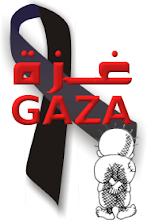
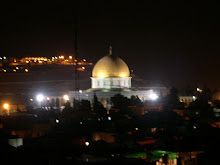
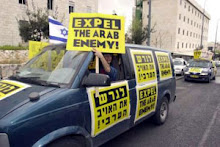




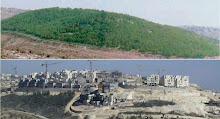



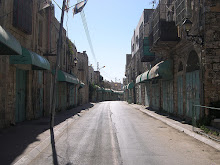
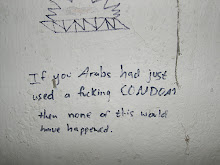
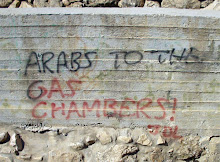

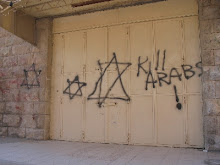
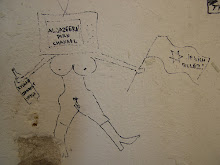
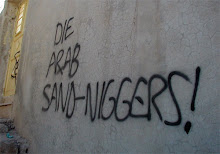
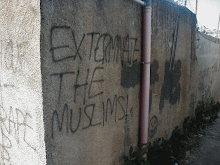
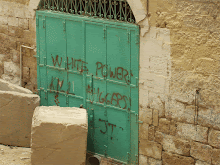



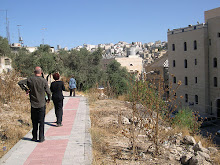

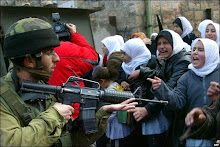
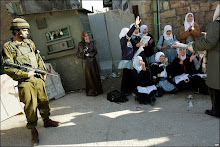
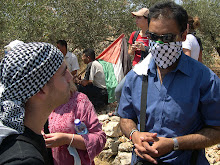
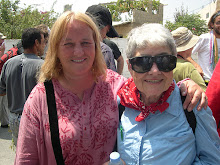
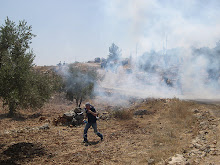
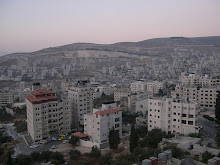

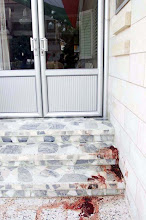








4 comments:
Hey A!
Your blog is great. It's very well written, I felt as though I was experiencing the things you did, as I read it...and it made me realise that it was never the 2 sided conflict that i believed it was...it's a sad story..
You have been really brave.
I have forwarded it to all my friends and family.
Take care
A..HE SAYS THAT HE IS A MUSLIM THAT WILL NOT BE LABELLED AN ANTI SEMITE...HE QUOTES REFERENCES FOR HIS RESEARCH...IRONICALLY HE QUOTES FROM ONLY ANTI ISRAELI ORGANIZATIONS...HE IS AN ANTI SEMITE..TO BLAME ISRAEL IN THE ABSENCE OF THE HORRIFIC ACTIONS OF PALESTINIANS AND THEIR TERRORIST LEADERS...LIKE HOW HAMAS THROWS PALESTINIANS OFF OF BUILDINGS AS JUSTICE...IS SIMPLY BIAS AND HATE..BY THE WAY YOU SHOULD QUIT CALLING ISRAEL APARTHEID..THIS IS FAR REMOVED..PARTICULARLY THAT NOW THAT APARTHEID IS GONE IN SOUTH AFRICA BLACKS ARE KILLING EACHOTHER AT RECORD NUMBERS MAKING IT THE HIGHEST IN THE WORLD....SIMILAR TO HOW HAMAS WILL BE KILLING PALESTINIANS BASED ON THEIR HISTORY
Thank you for your post 'anonymous'!
May I clarify that most of my quotes are actually from Israeli- and not 'anti-Israeli' organizations? B'Tselem, ICAHD, Physicians for Human Rights are all Israeli and predominantly Jewish.
As for me being an 'anti-Semite'- well, surely that requires one to criticize Judaism as a religion and Jews as a people? I'd like you to point out exactly where I have done this in my writings.
As for calling Israel an apartheid state- first go to Jimmy Carter, Hendrik Verwoerd, Desmond Tutu, Nelson Mandela and Ronnie Kasrils. They made the association long before I did.
One the one hand you say Israel is not an apartheid state, on the other you attempt to justify its actions by suggesting that apartheid was in some way good for South Africa. Am I hearing you correctly?
As for 'Hamas killing Palestinians'- they have a long way to go before they match Israel's record on this. Yes, there was a bloody conflict in the summer between Palestinian factions- but now, it's back to business as usual for Israel.
ChestDoc, well done, outstanding blog. You might want to visit my site: http://rememberpalestine.blogspot.com.
Keep up the good work.
Post a Comment